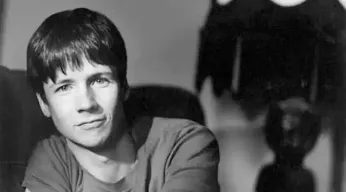
Jul 10
John Cameron Mitchell Reflects on Early Coming Out: “I Hadn’t Really Had Any Public Attention Up to That Point”
READ TIME: 3 MIN.
John Cameron Mitchell, widely known for his groundbreaking work on the cult musical “Hedwig and the Angry Inch,” has recently shared new insights into his experience of coming out as gay at the start of his career. Speaking in an interview published on July 7, 2025, Mitchell explained that, despite being open about his sexuality from a young age, he had not yet attracted significant public attention when he first came out. “I was always open in my work; I wasn't closeted,” Mitchell stated. “But I hadn't really had any public attention up to that point. I knew a lot of closeted actors, and some of them were horrified that I was committing career suicide. But by then, I just didn't want to work with someone who wouldn't work with me because I'm gay” .
Mitchell’s journey toward public openness was shaped by a combination of personal conviction and the environment of New York’s theater scene in the 1980s and 1990s. He privately came out at age 22 in 1985, to his family and friends, before making his sexuality public in a 1992 profile in The New York Times . “The profile didn’t make a big deal out of it, which I liked,” Mitchell recounted. “It was just part of the package of a person” . At a time when many actors remained closeted due to fears of professional repercussions, Mitchell’s approach was quietly radical. He emphasized authenticity over careerist calculation, setting a precedent for openness that would influence future generations of LGBTQ+ artists.
Mitchell’s body of work reflects a commitment to visibility and representation. After early roles in productions such as “Big River,” “The Secret Garden,” and “Six Degrees of Separation,” Mitchell’s breakout moment came with “Hedwig and the Angry Inch,” a story centered on a genderqueer punk singer’s search for identity and love. The show, which premiered in 1998, has since become a touchstone for LGBTQ+ representation in theater, film, and music . Mitchell’s subsequent projects, including the film “Shortbus” and the podcast “Anthem: Homunculus,” continued to push boundaries and explore queer narratives with nuance and empathy.
In interviews, Mitchell has spoken about the importance of storytelling as a vehicle for social change. “Art has always been a space where LGBTQ+ people could express themselves, even when society wasn’t ready to listen,” he observed in past conversations. By refusing to conceal his identity, Mitchell contributed to a gradual shift within the industry, paving the way for greater acceptance and diversity on stage and screen .
Mitchell’s experience underscores the complexities faced by LGBTQ+ performers in the late 20th century. The entertainment industry has historically been a double-edged sword—offering queer artists opportunities for self-expression while simultaneously pressuring them to conform to heteronormative expectations. Many actors, directors, and writers chose to remain closeted, fearing that coming out would jeopardize their careers. Mitchell’s refusal to hide who he was challenged those norms, even as he acknowledged the risks involved.
Today, Mitchell’s legacy is visible in the increasing number of openly LGBTQ+ actors and creators working across film, television, and theater. The landscape has changed significantly, with out actors such as Billy Porter, Elliot Page, and Laverne Cox achieving mainstream recognition. Yet Mitchell’s story is a reminder that this progress was hard-won, shaped by individuals who chose integrity over convenience in eras far less accepting than the present.
Mitchell remains a vocal advocate for LGBTQ+ rights and creative freedom. His reflections on coming out early in his career offer both inspiration and a call to action for the next generation of artists. As he continues to work on new projects and speak out about issues affecting the LGBTQ+ community, Mitchell’s journey stands as a testament to the enduring power of authenticity.
“The world is catching up to what queer people have always known,” Mitchell reflected in his recent interview. “That our stories matter, and that being true to yourself is the most important thing—on stage and off” .






